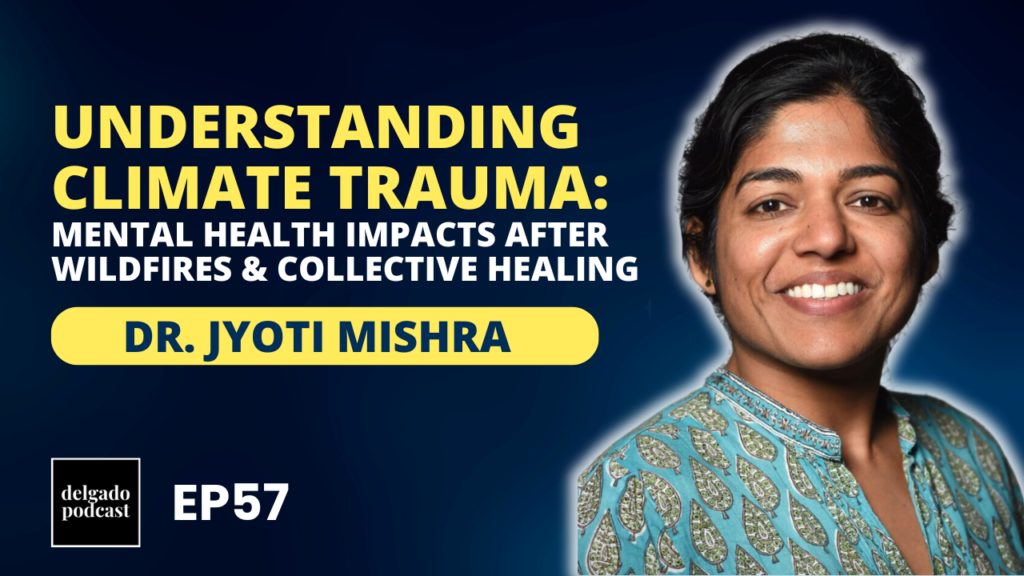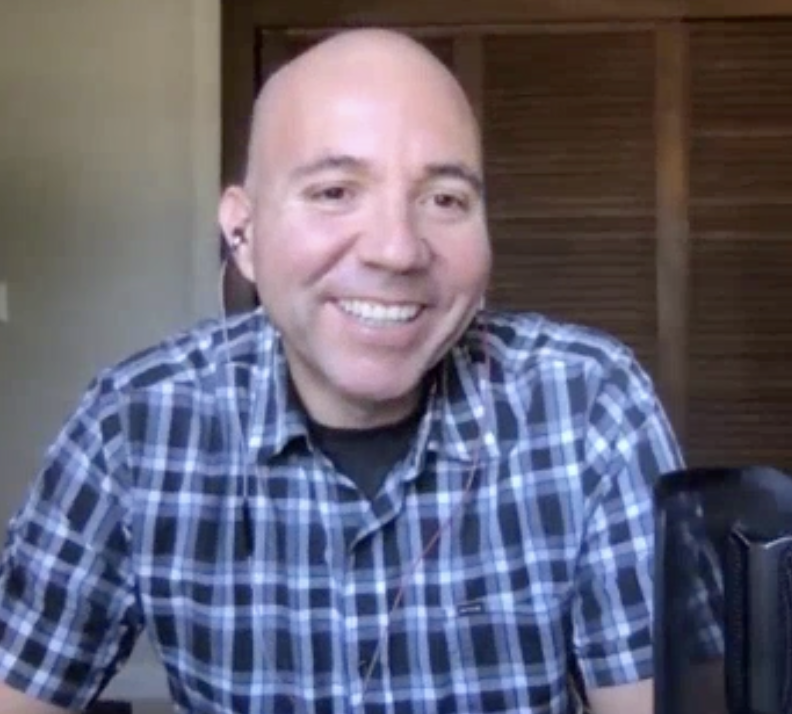
We’re honored to learn from Dr. Jyoti Mishra, a neuroscientist and associate professor of psychiatry at UC San Diego, about her groundbreaking research on climate trauma, neuroscience, and the intersection of mental health and environmental resilience.
You can get this full episode on iTunes, Spotify, Google Podcasts, or YouTube. You can also download or listen to the full podcast episode here.
In this episode of the Degado Podcast, Dr. Jyoti Mishra discusses the mental health impacts of environmental disasters and climate trauma. Dr. Mishra explains how events like wildfires lead to collective trauma, affecting entire communities with symptoms such as PTSD, anxiety, depression, and cognitive impairments like difficulty concentrating or making decisions. She discusses the phenomenon of “fire brain,” a hyper-aroused threat response that lingers long after the disaster has passed, emphasizing the importance of trauma-informed care for those affected.
Dr. Mishra also talks about the value of collective healing methods, including group therapies and eco-therapy. Eco-therapy, which uses nature as a therapeutic tool, provides survivors with opportunities to reconnect with the environment in a calming and restorative way. She also shares how these interventions can help in rebuilding resilience at both individual and community levels.
For individuals in acute crisis, Dr. Mishra shares practical interventions such as psychological first aid, mindfulness, and physical activity. These tools can offer immediate relief and support recovery while survivors await professional care. She also provides guidance for clinicians on recognizing and addressing long-term cognitive impacts, like decision-making difficulties, that may emerge after a disaster.
The episode concludes with a reminder about the importance of clinician self-care. Dr. Mishra emphasizes that mental health professionals working in disaster-affected areas must set boundaries and practice self-compassion to maintain their well-being. Her insights provide valuable guidance for therapists, social workers, and counselors navigating the unique challenges of climate trauma while fostering resilience in their communities and themselves.
Topics in this conversation:
1:05 – Dr. Mishra’s Journey into Climate Trauma Research
Understanding the intersection of neuroscience and climate trauma provides a foundation for addressing the psychological impacts of environmental disasters.
3:44 – How Wildfires Impact Mental Health
Wildfires can trigger PTSD, anxiety, depression, and cognitive impairments, demonstrating the need for trauma-informed mental health interventions.
5:04 – Symptoms of Climate Trauma: PTSD, Depression, and Cognitive Impact
Recognizing symptoms of climate trauma and understanding it as a shared, community-wide experience are essential for fostering collective healing and support systems.
8:04 – Indirect Trauma: Effects on Witnesses and Observers
Even those not directly affected by disasters can experience secondary trauma, emphasizing the importance of extending mental health resources to a wider audience.
10:23 – Immediate Interventions for Survivors of Climate Trauma & Wildfires
Practical strategies such as psychological first aid, mindfulness, and physical activity can help survivors build resilience during the acute recovery phase.
13:07 – Advice for Clinicians Supporting Trauma Survivors
Long-term symptoms like cognitive dysfunction and emotional distress require careful attention and tailored strategies to promote recovery.
16:23 – Cognitive Impacts of Wildfires (“Fire Brain”)
Hyperarousal in the brain can impair focus and decision-making, highlighting the importance of addressing cognitive challenges in trauma recovery.
20:16 – Resilience Strategies for Survivors of Climate Trauma Without Immediate Support
Encouraging survivors to maintain routines, engage in mindfulness, and seek support from their communities fosters stability and recovery.
24:10 – The Role of Eco-Therapy in Recovery
Eco-therapy utilizes nature’s restorative power, helping survivors reconnect with their environment in a therapeutic and calming way.
30:04 – Integrating Inner Healing with Environmental Restoration
Linking personal recovery to community rebuilding fosters resilience and reinforces the connection between mental health and environmental restoration.
You can watch the full episode here.
About Dr. Mishra
Dr. Jyoti Mishra is a neuroscientist and associate professor of psychiatry at UC San Diego, where she also serves as the founder of the Neural Engineering and Translation Labs. Her research focuses on the intersection of neuroscience, digital engineering, and machine learning to personalize mental health care. She is the co-director of the UC Climate Change and Mental Health Council and has conducted extensive work on the mental health impacts of environmental disasters, including wildfires. Dr. Mishra is a thought leader in climate trauma and community resilience, bringing innovative approaches to support individuals and communities affected by climate change.

